#Ribhu Gita
Explore tagged Tumblr posts
Text
Abide as That in which there is no awareness of the body, or the various functions of manifest existence, no perception of objects, That in which the mind is dead, the soul become one with the Reality, thoughts dissolved and even one's convictions no longer hold and with the firm conviction that you are That, be always happy.
Chapter 26. V. 32.
RIBHU GITA
6 notes
·
View notes
Text
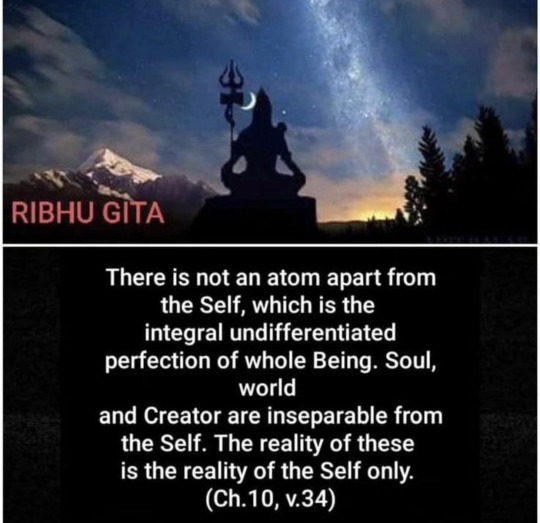
2 notes
·
View notes
Text
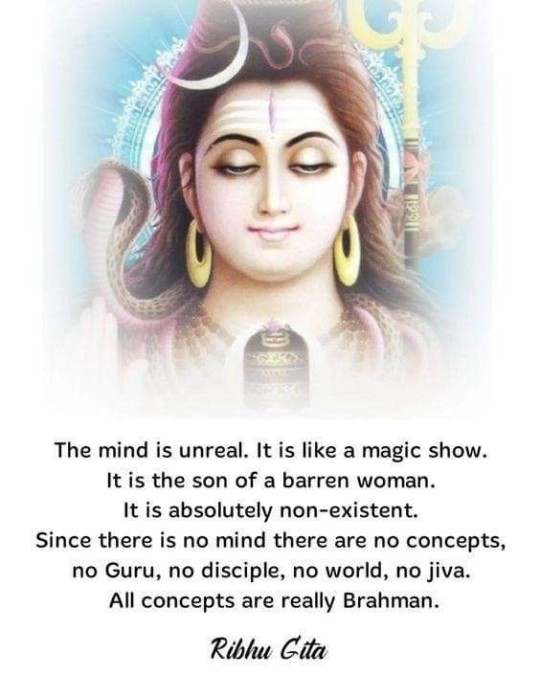
1 note
·
View note
Text

#ribhu#gita#vedanta#advaita#peace#happiness#hinduism#meditation#spirituality#wisdom#shiva#mind#adi shankaracharya#guru#disciple#world#jiva#Brahman#atman#nondualism#nonduality#nondual
24 notes
·
View notes
Text
original post by bumlehri on instagram
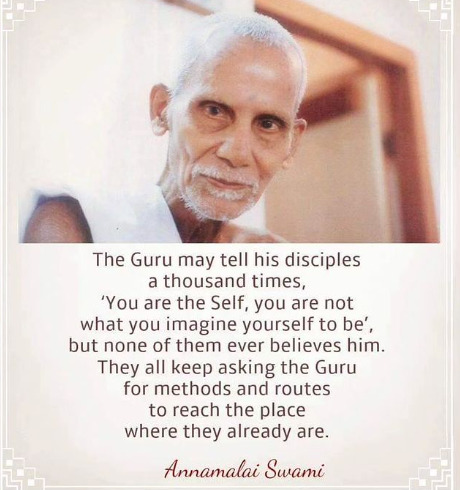
Q: I am convinced that I am, but I am not convinced of what I am. Intellectually I know I am the Self but I don’t experience this. I have to make a lot of effort.
Annamalai Swami: To experience the Self you have to dive deep into the consciousness ‘I am’.
Q: You mean I should keep the mind there?
Annamalai Swami: Yes. When you see the rope as a rope there is no snake. You also know that there was never a snake. When you cease to imagine that you are a mere body and a mind, reality shines of its own accord. If you stabilize in this state you can see that the mind didn’t go anywhere; you understand that it never really existed. ‘Keeping the mind in its source’ is just another way of saying: ‘Understanding that it never existed.’
Q: But how is one to awaken from perpetual body-consciousness? For consciousness to manifest one must have a body.
Annamalai Swami: If there is constant meditation that consciousness is your own reality in which all phenomena are appearing and disappearing, that meditation is the activity of the sattvic (pure, clean) mind. It is this activity which erases and dissolves the tamas (e.g. inertia or dullness, inactivity) and rajas (selfish desires e.g. sexual lust) which cover the reality.
The human body is the only vehicle in which it is very convenient to realize the unmanifest Self. With the body and the mind we can investigate and discover the Reality that remains unaffected by the body and the mind.
We should regard the body in the same way we regard a car. …
Q: No matter how quiet I get or how still my mind is, I never get to see the world as an indivisible whole. Even when my mind is completely still, if I open my eyes I still see a world of separate objects.
Annamalai Swami: When the one who sees vanishes, the world of multiplicity goes with it. You don’t see the unity and indivisibility, you are it. You can never see the Self or Brahman, you can only be it.
The Guru may tell his disciples a thousand times, ‘You are the Self, you are not what you imagine yourself to be’, but none of them ever believes him. They all keep asking the Guru for methods and routes to reach the place where they already are.
Q: Why don’t we give up our false ideas as soon as we are told that they are false?
Annamalai Swami: We have identified with our false ideas for many previous lifetimes. The habit is very strong. But not so strong that it cannot be dissolved through constant meditation.
Q: The seeker has many ideas: ‘I am a jiva (personality), I am bound and have to do sadhana ("methodical discipline to attain desired knowledge or goal) to attain liberation’. Should we forget all these ideas?
Annamalai Swami: Yes, forget them all! ‘I am the Self, I am all’. Hold onto this awareness. All other paths are roundabouts.
Q: Bhagavan said that repeating, ‘I am the Self’ or ‘I am not this body’ is an aid to enquiry but does not constitute the enquiry itself.
-ˋˏ’✄┈┈┈┈┈┈┈┈┈┈┈┈┈┈
Annamalai Swami: The meditation, ‘I am not the body or the mind, I am the immanent Self’ is a great aid for as long as one is not able to do self-enquiry properly or constantly. Bhagavan said, ‘Keeping the mind in the Heart is self-enquiry’. If you cannot do this by asking ‘Who am I?’ or by taking the I-thought back to its source, then meditation on the awareness ‘I am the all-pervasive Self’ is a great aid.
-ˋˏ’✄┈┈┈┈┈┈┈┈┈┈┈┈┈┈
Bhagavan often said that we should read and study the Ribhu Gita regularly.
In the Ribhu Gita it is said: ‘That bhavana (mental attitude) ‘I am not the body, I am not the mind, I am Brahman, I am everything,’ is to be repeated again and again until this becomes the natural state.’ Bhagavan sat with us every day while we chanted extracts from the Ribhu Gita which affirm the reality of the Self. It is true that he said that these repetitions are only an aid to self-enquiry, but they are a very powerful aid.
By practicing this way the mind becomes more and more attuned with the reality. When the mind has become purified by this practice, it is easier to take it back to its source and keep it there. When one is able to abide in the Self directly, one doesn’t need aids like this. But if this is not possible these practices can definitely help one.
- Living by the Words of Bhagawan.
69 notes
·
View notes
Text

Isvara:
Like bubbles arising on the waters of the ocean, gods and men and beasts of the phenomenal world arose, and will arise again and again, on the waters of the mass of solid Bliss (ghana ananda) in the Consort of Uma (Siva). There is no worldly misery for those who, through their experience, perceive all this arising out of the waves of delusion clearly as myself.
Because of delusion, people do not realize Hara to be known as the cause of every little thing and as the cause of every being and also as the boundless cause of even greater dissolution. When the presence of the Consort of Uma (Siva) shines in the reflecting pool of the recesses of the space of the heart, like the revered of birds (garuda), the destruction of the serpent of mundane misery results.
-Ribhu Gita:
Ramamoorthy, H.; Nome. , translation
- from the Original Sanskrit Epic Sivarahasyam
19 notes
·
View notes
Text
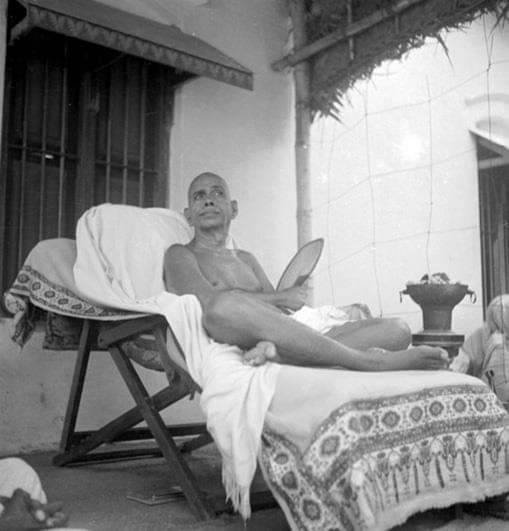

ANNAMALAI SWAMI – FINAL TALKS
'WHEN YOUR BODY IS THE WHOLE UNIVERSE ...'
During sleep, you have no likes and dislikes. Jnanis and babies manage this while they are awake. Baby mind is good; jnani mind is good; 'I am the body' mind is very, very bad.
Question: It's a poisonous thought!
Annamalai Swami: Yes, yes. The 'I am the body' thought is just as poisonous as a cobra. 'All is my Self.' 'All is the nectar of my own Self.' These are the great affirmations that counter the 'I am the body' thought.
Holding on to one of these sayings is the equal of millions of punyas. If we continuously meditate on the truth of these statements, if we hold on to the truth that they are pointing towards, countless punyas will accrue to us.
There are many other mantras, but none are as useful as these. Ribhu Gita says, 'All is one. All is the Self.'
This is the truth that you have to hold onto. To the real ‘I’ nothing is foreign in the entire universe. If you know you are everything, there will be no desire to pursue some things and not others. Do you like or desire your arm more than your foot? When your body is the whole universe, likes, dislikes and desires will be absent.
15 notes
·
View notes
Text
Intoduction to the Annapurna Upanishad, the Exploration of the Mysteries of the Queen of Foods.
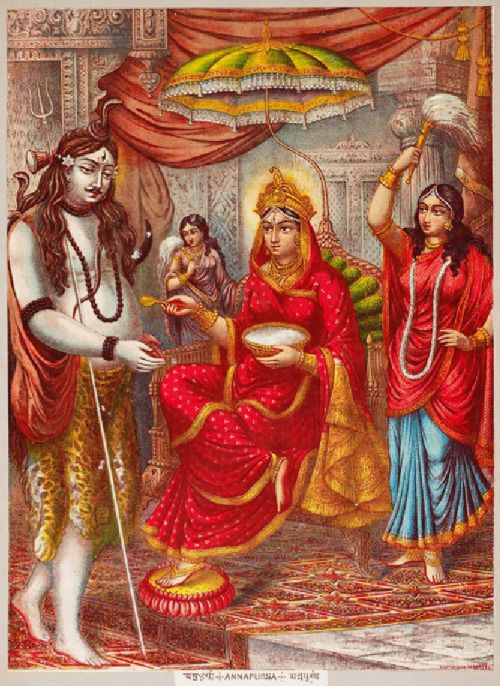
The Annapurna Upanishad was written around 3-4 CE. It is numbered 79 of 108 Upanishads and is contained in the Atharva Veda.
Annapurna means Queen of Foods. She is an emanation of gooddess Parvati, "the goddess of the mountain stream" the Ganges. She is often depicted as the partner of the god Shiva, but is also worshipped on Her Own. As the Feminine Aspect she is without rivals.
The food people eat influences their nature and vice versa. The Chhāndogya Upaniṣhad explains that the coarsest part of the food we eat passes out as feces; the subtler part becomes flesh; and the subtlest part becomes the mind (6.5.1). Again, it states: āhāra śhuddhau sattva śhuddhiḥ (7.26.2) “By eating pure food, the mind becomes pure.” The reverse is also true—people with pure minds prefer pure foods.
Although we might like to have junk, oily and spicy food, it is not good for our health and invariably causes illness. To curb the tāmasic [lazy] and rājasic [ambitious] nature of our mind and to follow a sāttvic [saintlike] regime is the only way to have healthy body and mind. “The pleasures that arise from contact with the sense objects, though appearing as enjoyable to worldly-minded people, are verily a source of misery. And such pleasures have a beginning and an end, and so the wise do not delight in them.” (Bhagavad Gita 5.22)
Therefore, we should be in constant check of what we eat as it has direct effect on our body and our mind.
Here begins the Upanishad.
Om ! O Devas, may we hear with our ears what is auspicious;
May we see with our eyes what is auspicious, O ye worthy of worship !
May we enjoy the term of life allotted by the Devas, Praising them with our body and limbs steady !
May the glorious Indra bless us !
May the all-knowing Sun bless us !
May Garuda, the thunderbolt for evil, bless us !
May Brihaspati grant us well-being !
Om ! Let there be Peace in me ! Let there be Peace in my environment ! Let there be Peace in the forces that act on me !
I-1-2. The king of Yogins, Nidagha, prostrated flat (like a rod) before Ribhu, that pre-eminent knower of Brahman. Then, rising, that ascetic respectfully said, ‘Teach me the truth about the Self; by what kind of adoration have you, Oh Brahmana, attained this state ?
I-3-4. Teach me that grand science which yields sovereignty over the empire of emancipation. ‘You have done well, Nidagha ! Listen to eternal science by the knowledge of which alone will you be liberated life. Lodged in Om that envelopes the Root of phenomena (Brahman), supporting the syllable ‘aim’,
I-5-7. ‘Eternal bliss, independent (‘hrim’), renowned, with streaming stresses (‘sauh’), the ruler of the world (‘srim’), Mahalakshmi, (at once) desire (‘klim’), fulfilment, and humanity, is the divine Annapurna. ‘I begged of Her, using the celebrated and quintessential incantation of 27 syllables, cultivated by hosts of female ascetics,
I-8. ‘Namely, aim, hrim, sauh, srim, klim, aum namo bhagavatyannapurne mamabhilashitam annam dehi Svaha. [Salutation, O divine Annapurna, vouchsafe the food I desire]: ‘Thus have I been instructed by my father. From then on have I established myself in (this) discipline, persisting in the activities of my station (in life) and have given myself up to the daily practice of this incantation.
I-9. ‘When many days passed thus, there appeared in front of me Annapurna, wide-eyed, her lotus-face beaming with a smile.
I-10. ‘Seeing her, I prostrated flat on the ground, and (then) stood up with folded hands. “Well, child, you have done well; ask of me a boon, delay not.”
I-11. Oh (Nidagha), best of sages ! Thus hidden by the wide-eyed (deity) I spoke: ‘O Daughter of the mountain, may the truth of the Self dawn on my mind’.
I-12. Saying ‘be it so’ she vanished, then and there. Then, through the perception of the world’s variety the idea (mati) arose in me.
I-13. Delusion appears five-fold; it will be presently set forth. Due to the first delusion, Jiva and God appear to have different forms.
I-14. Due to the second, the attribute of agency dwelling in the Self appears to be real. The third (consists in) deeming the Jiva associated with the three bodies as having attachment.
I-15. The fourth takes the world-cause (God) to be mutable. The fifth delusion ascribes reality to the world as distinguished from its cause. Then, also, in the mind flashes the cessation of the five-fold delusion.
I-16. From that moment, spontaneously, my mind was assimilated to Brahman. O Nidagha, thus may you, too, secure knowledge of reality.
The Upanishad does not suggest we get into the car and drive to New Jersey in search of an Annapurna Temple and commit idolatry. All Hindus know the gods are emblems of the process of the discovery of the Self. Annapurna the Queen of Foods is an aspect of the Supreme Being that helps us become secure in the teachings of the guru and the scriptures in the discovery of the ultimate truth of existence.
Shruti, the "spiritual narrator" of the text says, "yes, man can become an Agent of the Supreme Abode if his appetites for wisdom include "secure knowledge of the Almighty."
All the Upanishads suggest the following process for acquiring this knowledge which is called the Annapurna, "the Queen." It be used by persons of any faith.
Pray with a question about the nature of the Self, "Teach me that grand science which yields sovereignty over the empire of emancipation."
Now we know there are dipshitz out there trying to trap us in ignorance with discussions about nonsense and nonesuch. They are demoniacs and there is proof- their strife is ruining this planet.
So first, we have to realize the real purpose of religion is freedom from strife.
2. Freedom from the envelope of ignorance comes from science and knowledge.
3. The gods and goddesses vanish after they open the door of the mind to understanding. They are doors to the inner workings of all extant phenomena, they can do not much more. "Through the perception of the world’s variety the idea (mati) arose in me."
4. God, the gods, and the Self and all phenomena appear to be of different forms and natures. This "variety" is false. Due to delusion, the soul and God appear to have different forms.
5. Agency is the reason why delusion persists. Agency is the belief we can alter reality because we believe or have faith or repeat incantations but this also false. God is in charge of Himself, and is the Maker of Heaven and earth, not man.
6. Attachment to false ideas and impure desires cause the self to stray from the fold of the Self. Love, the very best food is the cure for all attachment.
7. God does not change, we do. Through meditation upon the Changeless, the self hinges upon a substratum it can depend upon for the purposes of weathering that which is subject to change.
8. The ultimate knowledge separates all causes from effects, and ascribes reality to its proper causes.
From the moment we accept the above path, secure knowledge of reality, the Annapurna, the Queen of Foods is ours for the taking. There should be no strife in the world due to religion or the partaking of knowledge from its proper authorities and sources.
Through the study of the Upanishads and faith if the Sublime Spirit explained within them, all strife should vanish, dissolved in the Truth never to surface again.
0 notes
Text

Attachment and abhorrence are attributes of the mind. The mind is never yours. You are Intelligence itself, free from conflict, and changeless. Go about happily
Ribhu Gita
0 notes
Text
“I am the form of contentment every where.I am full of all-encompassing Bliss.I am the complete nature of complete void.”
Ribhu Gita
1 note
·
View note
Text

4 notes
·
View notes
Text

Abide as That; in which there are no Holy Scriptures or sacred books, no one who thinks, no objection or answer to it, no theory to be established, no theory to be rejected, nothing other than one Self - and be always happy, free from the least trace of thought...
~ Ribhu Gita
34 notes
·
View notes
Quote
The Self alone is the spontaneous self effulgent Awareness; that alone is eternal bliss; that alone is Existence everlasting; that alone is all embracing perfection, the sole God- head without a rival and the sole primordial stuff of the Universe. In the conviction born of this experience, one should ever abide, as the sole I AM, the Supreme Self.
Ribhu Gita
8 notes
·
View notes
Quote
In that Self wherein desire, anger, covetousness, confusion, bigotry and envy are all absent; in the Self wherein there is no thought of bondage or release, one should abide blissfully still, eschewing the least ripple of thought.
From “The Essence of Ribhu Gita” by Prof. N. R. Krishnamurthi Aiyer
#Ribhu Gita#Sahaja Nishta or The Natural State#being-consciousness-bliss#self-realization#self-knowledge
15 notes
·
View notes
